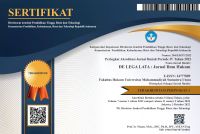Disclosure Of Criminal Acts Of Fraud Using Social Engineering Mode Committed By Subdit V Cyber Directorate of Special Criminal Investigation South Sumatera Regional Police
Abstract
In the current era of globalization, technological progress is progressing very rapidly. We can find out information about events in other parts of the world just by accessing news via the Internet. The research method used is an empirical juridical method. What the author studied was the obstacles faced by Sub-Directorate V Cyber Ditres Crimsus Polda South Sumatra in uncovering criminal acts of fraud using social engineering. Results: From the explanation above, it is clear that crime is influenced by the social conditions of society, which can indirectly cause or encourage crime.
Full Text:
PDFReferences
Christianto, H. (2020). The Concept of the Right to Be Forgotten as Fulfillment of the Rights of Revenge Porn Victims Based on Article 26 of the Information and Electronic Transactions Law. Legal Pulpit - Faculty of Law, Gadjah Mada University, 32(2), 175.
Daniel. (2015). Corporate Criminal Liability According To Indonesian Positive Law. Lex Crimen, IV(8), 5–14.
HANANTA, D. (2018). Consideration of Mitigating and Aggravating Circumstances in Sentencing. Journal of Law and Justice, 7(1), 87.
Kesuma, IGMJ, Widiati, IAP, & Sugiartha, ING (2020). Law Enforcement Against Fraud Through Electronic Media. Journal of Legal Preferences, 1(2), 72–77. https://doi.org/10.22225/jph.1.2.2345.72-77
Kuspraningrum, E. (2011). The Validity of Electronic Contracts in the ITE Law is Judging from Article 1320 of the Civil Code and the UNCITRAL Model Law on Electronic Commerce. Unmul Faculty of Law Law Minutes, 7(2), 64–76.
Nugroho, DS (2015). Law Enforcement Mechanisms Against Criminal Acts Of Fraud Through Electronic Media. Lex Administratum, 151(1), 10–17.
Oratmangun, AY (2016). Legal Review Of The Capability Of Responsibility According To Article 44 Of The Kuhp. Lex Et Societatis, IV(May), 31–48.
Rahmad, N. (2019). Legal Study of Online Fraud Crimes. Journal of Sharia Economic Law, 3(2), 103–117.
Rosana, AS (2010). Advances in Information and Communication Technology in the Media Industry in Indonesia. Echoes of Exos, 5(2), 146–148. https://www.neliti.com/id/publications/218225/kemajuan-technology-information-dan-komunikasi-dalam-industri-media-di-indonesia
Sastrawanto Ongko, J. (2021). Law Enforcement Against Humanitarian Action Donation Fraud in Indonesia. Undiksha Journal of Citizenship Education, 9(3), 801–811.
Setiawan, W. (2017). The Digital Era and Its Challenges. National Education Seminar. CORE, 1–9.
Sriwidodo, J. (2019). Indonesian Criminal Law Study "Theory and Practice": Vol. Vol. 1, (Issue No. 69).
Suharsimi. (2019). Law and Legal Research (Vol. 2).
Suyatno. (2023). Getting to know digital wallets in indonesia. Cv. Aa rizky.
Usman. (2011). Analysis of the Development of Criminal Law Theory. Jambi Legal Science Journal, 2(1), 1–10.
Widiartana, G. (2017). Restorative Justice Paradigm in Combating Crime Using Criminal Law. Justitia et Pax, 33(1), 1–23. https://doi.org/10.24002/jep.v33i1.1418
Zahran, WS, & Isfianita, II (2023). Analysis of the Implementation of Intensification of Hotel Tax Collection on Boarding Houses at the Regional Tax Service Agency of Bekasi Regency. Scientific Journal of Administrative Sciences, 6(2), 202–212.
DOI: https://doi.org/10.30596/dll.v9i1.18516
Refbacks
- There are currently no refbacks.
Address:
Faculty of Law, University of Muhammadiyah Sumatera Utara Jl. Kapten Mukhtar Basri No. 3 Medan, Kode Pos 20238
E-mail: delegalata@umsu.ac.id
Telp/HP/WA : 081262664567
DE LEGA LATA: Jurnal Ilmu Hukum is abstracting & indexing in the following databases:
De Lega Lata: Jurnal Ilmu Hukum is licensed under a Creative Commons Attribution-ShareAlike 4.0 International License.
Statcounter










